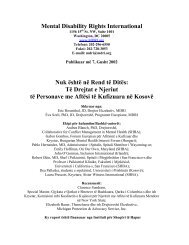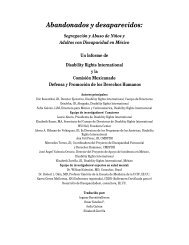Torture not Treatment - Disability Rights International
Torture not Treatment - Disability Rights International
Torture not Treatment - Disability Rights International
Create successful ePaper yourself
Turn your PDF publications into a flip-book with our unique Google optimized e-Paper software.
TORTURE NOT TREATMENT<br />
Methodology and Sources<br />
This report primarily draws on facts that are in the public record – the findings of numerous state<br />
agencies and licensing boards, judicial decisions, and testimony before the Massachusetts<br />
legislature during the consideration of legislation to regulate aversive treatment. More than any<br />
other source, the report relies on the information that the Judge Rotenberg Center (JRC) provides<br />
about its own programs on its website. The website includes first-hand testimonies of students<br />
and parents. MDRI has supplemented these sources by conducting interviews with one former<br />
student, three mothers of former students, one former staff, and numerous mental health<br />
professionals and attorneys who have been involved in regulating JRC or representing clients at<br />
JRC.<br />
There has been extensive reporting in the press on practices at JRC. We provide references to<br />
press sources to supplement public sources or the JRC website, but we do <strong>not</strong> rely on press<br />
sources for our major findings.<br />
MDRI makes a number of references to two in-depth public reports based on site visits by<br />
professionals to JRC. Both reports provide helpful background information and analysis. The<br />
first is the recertification report of the Commonwealth of Massachusetts, Department of Mental<br />
Retardation, published on April 27, 2009. This report was written by a multi-disciplinary<br />
Certification Team with expertise in development and implementation of behavioral<br />
modification plans. The team included two doctoral level psychologists and a board-certified<br />
psychiatrist. The team reviewed extensive documentation at JRC, including the written<br />
application for certification, individual records, outcome data and independent clinicians‘<br />
reports. The team also interviewed and observed numerous students.<br />
MDRI also refers to the analysis and findings of the New York State Education Department<br />
(NYSED) published in June 9, 2006. This report was based on an announced visit to JRC April<br />
25-26, 2006 and an unannounced visit May 16-18, 2006. The team included three behavioral<br />
psychologists and four members of the NYSED staff.<br />
MDRI has no way of determining whether all the practices observed by the Massachusetts<br />
Certification Team or NYSED team are still taking place. As described in this report, however,<br />
many of the findings of NYSED in 2006 were later documented by the Massachusetts team in<br />
2009. As presented on JRC‘s website, however, the essential nature of JRC‘s core treatment<br />
program remains the same. MDRI’s core findings and analysis would remain the same if we<br />
relied solely on the current information about practices at JRC now available on their own<br />
website and if we assumed that JRC were complying substantially with Massachusetts<br />
regulations on aversives.<br />
5




